 Petzlover
PetzloverBoth English White Terrier and Jack Russell Terrier are originated from United Kingdom. English White Terrier may grow 8 cm / 4 inches higher than Jack Russell Terrier. Both English White Terrier and Jack Russell Terrier are having almost same weight. English White Terrier may live 8 years less than Jack Russell Terrier. Both English White Terrier and Jack Russell Terrier has almost same litter size. English White Terrier requires Moderate Maintenance. But Jack Russell Terrier requires Low Maintenance
The English White Terrier was developed in the 1860’s by a group of breeders from the Sealyham terriers, the Jack Russell terrier, and the Fox Terrier. These breeders were looking for a white terrier that could be more successful in the show ring than the current prick-eared English terrier. They named their new breed, the English White Terrier or the Old English terrier. In later years in the United States, the English White Terrier was mixed again with the Rat Terrier and the Old English Bulldog to create both the Boston terrier and the Bull terrier.
Although the breed did not last long it did have a prestigious ancestry that could be traced back centuries in England among ancient terriers. The word terrier was in use in England in 1440, showing that the dogs were well known at that time. Most historians agree that the dogs were even older than the 1400’s. It is believed that terriers who “went to ground” after prey, existed as far back as the time of Christ in England.
Most of these ancestors of the English White Terrier were not white. White terriers came onto the scene around the 1700’s.The first picture of white terriers appeared in 1790 when Sawre Gilpin, a British artist, painted “A Huntsman with Hounds Foxhunting” and the terriers in the painting were white with brown marks. Others began to show the same kind of terriers in their artwork – white coated. Before this it is believed that breeders killed the white terriers at birth because they were often deaf and inferior to the other terriers. In the early part of the 19th century, the white terrier began to be completely white with no markings. The Kennel Club recognized them in 1874 as the White English Terrier.
The breed faced many genetic issues, deafness and the Kennel Clubs felt there was no difference between the current White English terrier and the English White terrier despite the difference in their ears. The new English White Terrier had dropped ears instead of Prick-ears. They considered them to be the same breed and not even different types. They were the smallest of all terriers and considered to be a good pet but not a show dog or a working dog. Because of this it was not very popular, and it actually had been bred to be a show dog and not a working dog. The English White Terrier was not recognized by any Kennel Club and within 30 years it was extinct.
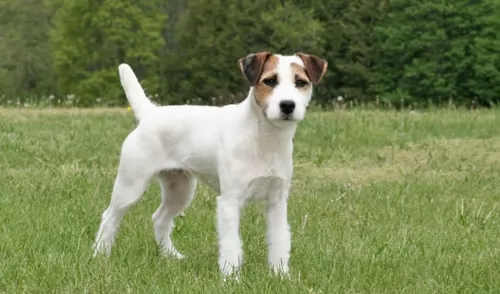 The popular Jack Russell Terrier was developed in Devonshire in the south of England in the late 1800's so as to hunt foxes.
The popular Jack Russell Terrier was developed in Devonshire in the south of England in the late 1800's so as to hunt foxes.
Often believed to be the Parson Russell Terrier, the Jack Russell Terrier was developed by Parson John Russell. This is where the dog gets his breed name from. Some people get the Jack Russell Terrier a little bit mixed up with the Parson Russell terrier, when it fact its actually a different breed, but sharing a common ancestry.
The Jack Russell Terrier is smaller than the Parson and bigger than the Russell Terrier. The breed became known in the U.S. by the 1930s and the Jack Russell Terrier Association of America wanted recognition by the American Kennel Club, which was granted in 2000.
The English White Terrier had a pure white coat with no markings of any kind. His coat was short, hard, and glossy and his body was firm, muscular and hard. The breed was small – almost a toy. They had a body like the Manchester Terrier. They had long legs and large feet. The tail was medium size and straight out from the body.
The English White Terrier had a very refined head with a fairly long muzzle. Their bite was even, and their eyes were brown, amber or black. Their ears dropped – unlike the pricked ears of the White English Terrier.
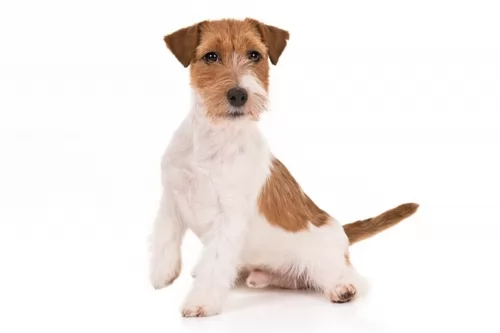 The Jack Russell Terrier is a small dog that weighs between 6 and 8kg and stands at between 25 – 38cm. The body length of the dog should be in proportion to the height.
The Jack Russell Terrier is a small dog that weighs between 6 and 8kg and stands at between 25 – 38cm. The body length of the dog should be in proportion to the height.
He is essentially a white dog with orange or fawn colored patches. The coat is mostly smooth and short, but the coat can also be longer and rough or it can be broken which is a combination of rough and smooth. Regardless of coat type, they are dense, double coats which will require brushing at least twice a week to remove loose hairs. He may also be tri-colored such as being white with black and tan patches.
He has alert, bright dark brown eyes and ears which are somewhat erect and which flop over at the tips. The tail has always been traditionally docked, giving him an attractive, compact look about him but unfortunately the tail is often left long on the dog these days.
Your Jack Russell Terrier is a lively, tenacious, bold, fearless, feisty, cheeky, confident, independent, intelligent and full of life dog. He is super energetic and exuberant, spirited and full of personality.
There are some dog owners who are exhausted by him and would prefer a more quieter dog breed as their companion. Nonetheless he has some excellent characteristics such as being a totally devoted and loving dog.
It is why it is a good idea to have him trained and socialized as it calms him down and makes him more obedient. He is very intelligent and training him will be easy.
The English White Terrier was affectionate and devoted to his family. It was the softest tempered of all terriers and made an excellent pet. Some of the English White Terriers were animal aggressive while others were not. Training was difficult because of the wide-spread deafness in the breed. IT loved to be cuddled and held. They were also tenacious and game for any type of fight or hunt despite their size and deficiencies.
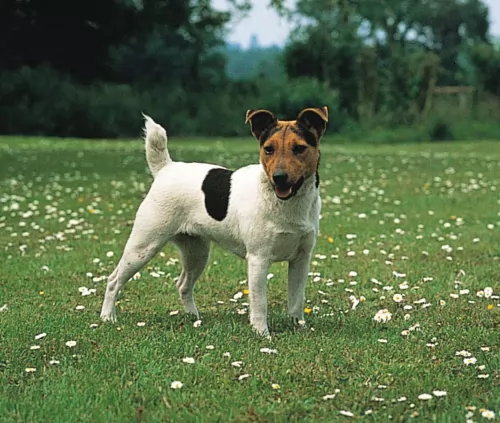 With loads of vibrant personality, the energetic Jack Russell Terrier has got so many wonderful characteristics to his name – devotion, intelligence, charming, lively, playful and he is an entertainer – you’ll always be laughing a him.
With loads of vibrant personality, the energetic Jack Russell Terrier has got so many wonderful characteristics to his name – devotion, intelligence, charming, lively, playful and he is an entertainer – you’ll always be laughing a him.
You do need to pay him attention – you can’t just plonk him in your backyard and forget about him. He wants your love and attention and ignoring him can lead to problem behavior such as obsessive barking.
Give your Jack Russell Terrier all the love and care he needs, and you’ll have an exceptional pet and friend.
The breed was considered to be unhealthy for the most part and became extinct because of this. Many complained that the breed was inbred and had a weak constitution because of it. Deafness was prevalent throughout the breed. This deafness occurs in many white animals, but the English White Terrier had the highest rates among all white dogs.
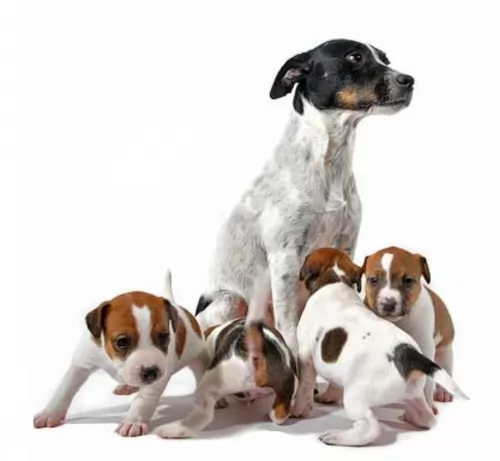 This particular dog breed has a reputation for being healthy and living to a good age such as 16 or 17 years of age. Of course he needs to be given proper care to reach such a good age.
This particular dog breed has a reputation for being healthy and living to a good age such as 16 or 17 years of age. Of course he needs to be given proper care to reach such a good age.
Some common dog disorders you might want to be aware of are -
Lens luxation is actually a common hereditary disorder in these dogs, but even so, with good care, your dog isn’t likely to battle with it. What happens is that the lens in the eye becomes displaced. There are two types, with Posterior luxation being the lesser severe one.Treatment is available.
Patellar luxation is an hereditary disorder affecting the knees of the dog. The kneecap slips off the groove where it sits and you may notice your dog running while holding his hind leg in the air. It can sometimes slip back in place and then you see your dog running in his usual way. It becomes more serious when it affects both legs.
It was best to feed the English White Terrier 1-2 cups of dry meal per day served in 2 meals.
As mention previously, the English White Terrier was congenitally deaf and had a weak constitution.
This little dog with all its problems was still a very energetic dog and needed considerable exercise. Owners had to develop exercises and games to keep the English White Terrier occupied as with any terrier. If they didn’t have a job or something to occupy their minds and bodies, they were destructive.
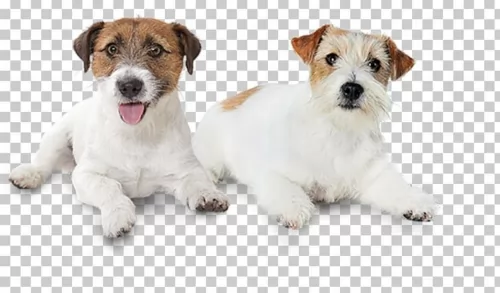 The Jack Russell Terrier isn’t just a small dog that can be left to his own devices. He will need proper training and socialization early in life to make him obedient and better to get on with.
The Jack Russell Terrier isn’t just a small dog that can be left to his own devices. He will need proper training and socialization early in life to make him obedient and better to get on with.
He may be a small dog, but he certainly won’t do in the city where he is cooped up in a place with a handkerchief of a garden. He needs lots of space to run and play. He wants his human family to join in with walks, hikes, ball games and swimming.
You can buy excellent commercially manufactured dog food which caters for energetic small dog breeds like the Jack Russell Terrier.
Once you have selected the best one for your pet, with dry kibble being better in terms of dental health - you can also add in some brown rice, vegetables and cooked chicken. This is highly beneficial to all dog breeds. A little bit of raw meat can sometimes be added in too.
The bottom line is to to prevent your pet from eating foods high in preservatives, additives and fillers. Never leave your pet without a constant supply of fresh, cool water.